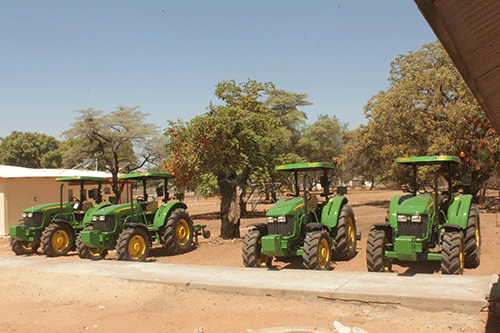The agriculture ministry will provide 145 tractors for subsistence farmers, especially in the north as experts forecast a wet 2022/23 rainfall season for the SADC region.
Regional weather forecasts indicate normal to above-normal rainfall through the 2022/23 farming season in most of the Southern Africa Development Community (SADC).
“The ministry provides subsidised mechanised services, such as ripping, ploughing and planting services by government tractors. The servicing of tractors is ongoing. The ministry is currently servicing and repairing tractors and implements to ensure that the tractors are ready for the ploughing season, which commenced on 1 November 2022.
“All cereal producers in 10 crop growing regions qualify for this subsidy programme. Farmers are advised to visit their agricultural development centres to register for these services. The services are demand-driven and are based on a first-come, first-served basis, with priority to farmers who have not yet benefitted from the programme,” said agriculture ministry spokesperson Jona Musheko.
However, some local subsistence farmers in the northern parts of Namibia expressed concern that the government tractor services or ploughing implements reach them late when the wet season has kicked off.
This, they feel, disadvantages them to maximise their crop production and be on par with other farmers.
The 145 government tractors form part of the ministry’s DCPP subsidy programme, which commenced on 1 November 2022 in all 10 crop-growing regions.
The ministry of agriculture is implementing agronomic programmes, such as the Dry Land Crop Production Programme (DCPP), complemented by the Cereal Value Chain Development Programme (CVCDP) and the Comprehensive Conservation Agriculture Programme (CCAP), among others.
Musheko said the ministry continues to provide subsidies on inputs such as seeds and fertilisers, as well as mechanised tillage services as per the DCPP guidelines 2022 /2023.The government provides tractors to local farmers at a subsidised price.
However, most subsistence farmers still do not benefit much from this programme, as government-subsidised tractors are not enough.
To address this challenge, Musheko indicated the government has over the years roped in private tractor owners in a price-sharing scheme, whereby the farmer pays half and the government the other half.
Furthermore, Musheko confirmed a budgetary facility is made for the provision of subsidies on the use of private tractors.
The government has made N$30 million available for the implementation of rain-fed crop production programmes.
The DCPP and CVCDP are implemented in the 10 crop-growing regions (Kunene, Omusati, Oshana, Oshikoto, Ohangwena, Kavango West, Kavango East, Zambezi, Otjozondjupa and Omaheke), while the CCAP is implemented in all 14 regions.
These programmes aim to ensure and accelerate the provision of subsidised agricultural production inputs (improved seeds and fertilisers) and mechanised services (tillage and planting).
This, the ministry said, will increase crop yield, food and nutrition security, creating employment opportunities, as well as contributing to the reduction in poverty and income inequality.
Sadly, there are allegations that some unscrupulous individuals who do not even own mahangu fields are taking advantage of the government seed programme, whereby these characters collect seeds and later sell them for a profit even at the open markets.
In response, Musheko said the DCPP guidelines set criteria on how to benefit from the programme.
“The DCPP services are rendered jointly with the regional councils. The ministry is not aware of such allegations; however, control measures are in place to ensure the correct beneficiaries benefit from the programme. The control measures include the available DCPP guidelines and the ongoing monitoring interventions on the programme,” he remarked.
– anakale@nepc.com.na


